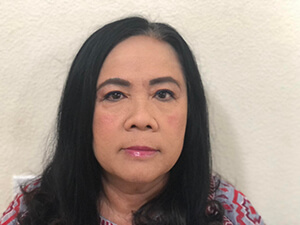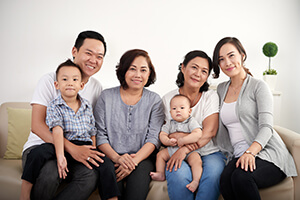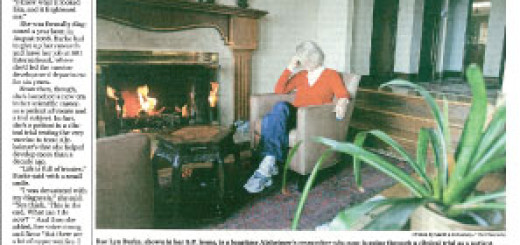Volunteer brings Alzheimer’s education to Vietnamese community
When Dr. Phuong Le’s mother was diagnosed with Alzheimer’s disease, Phuong’s siblings were quick to dismiss it as a normal part of aging. Through her work in memory care, Phuong knew this not to be true. Since her mother’s diagnosis, Phuong has made it her mission to bring dementia education and resources to the Vietnamese community by volunteering with the Alzheimer’s Association®.
Supporting her family
Phuong’s mother was born in South Vietnam. Despite a second-grade education, she was very smart and a fast learner. Phuong’s mother was funny and a great cook. After having nine children, her husband, who was in the Vietnamese Army, moved to the United States for a family reunion and decided to stay.
Following her husband, Phuong’s mother came to the United States and spent the next 15 years working as a sous-chef at a famous Vietnamese restaurant in the Bay Area. Despite her large family, she continued to send money to Vietnam to help her brothers and sisters.
“My mother was very talented, and one of the most caring people,” said Phuong. “She knew she only had a second-grade education, which made her timid. She spoke no English. She never drove but she was a good wife and an excellent mother.”
Noticing the signs
Phuong, who has a doctorate degree in nursing, has been working in a memory clinic for several decades. She knows the signs of dementia and the testing required to get a diagnosis. It comes as no surprise that in 2006, when her mother began to show signs of cognitive impairment, Phuong was the first of her nine siblings to notice.
“Before [Alzheimer’s] she would ask to meet friends and [she had] stopped asking to do that. She talked less, watched TV and dozed off during the day. She had less energy and was less socially active.”
The biggest sign for Phuong was when her mother messed up a Vietnamese dish she made regularly. “She used to cook a very good Vietnamese dish, and all of a sudden she messed up everything in that dish.”
When her mother started asking Phuong the same question 10 times within 10 minutes, Phuong knew it was time to call the doctor.
Calling the doctor
According to the Alzheimer’s Association 2022 Alzheimer’s disease Facts and Figures report, nearly 40% of primary care physicians reported never or “only sometimes” being comfortable personally making a diagnosis of Alzheimer’s or other dementias.
This was true for Phuong when she called her mother’s doctor. “I did a [cognitive] test for my mom; her score was very low,” said Phuong. “I contacted her primary care physician. [I told him] ‘This is what I’m finding and seeing, can you please do testing?’ The doctor said, ‘I don’t know what to do. Whatever you want, I’ll go along with you.’”
Phuong suggested that her mother get some testing or see a specialist. Her mother’s doctor referred her to a neurologist who ran the same tests as Phuong. Because her mother didn’t speak any English, an interpreter was called in to assist. Phuong said, “I was there and heard everything. I was convinced she had Alzheimer’s disease.”
In 2006, after receiving the results of the tests, the neurologist diagnosed Phuong’s mother with Alzheimer’s disease.
Skeptical siblings
At first, Phuong’s siblings didn’t believe that their mother’s diagnosis was real. As the youngest child in the family, Phuong was quickly dismissed, despite her professional background.
“When I brought it up, they were all upset,” said Phuong. “My brothers and sisters are highly educated. They said, ‘She’s 84 and this is normal for her. I don’t see anything wrong with her, she remembers things from 40 years ago. You get paranoid, you work for a memory clinic, so you think it’s that.’”
It took Phuong’s siblings about a year before they accepted that this wasn’t a normal part of aging. “She lost the control of [her] bowels and bladder and had sundowning issues,” said Phuong. “She got agitated. This is not Mom. Finally, the rest of them got it.”
Accepting the diagnosis
Once Phuong’s siblings accepted the diagnosis, they wanted to learn everything they could. They were upset with themselves for taking so long to accept the truth. Phuong assured them it wasn’t too late to learn about the disease.
“I told them, this is the website, we can talk about that. We all became very aware,” said Phuong. “They went online, attended support groups, [and learned] how to communicate better with mom.”
As part of her disease, Phuong’s mother had hallucinations, such as seeing a cat in the house that wasn’t there. Before accepting the diagnosis, Phuong’s siblings might go in search of the cat in the house.
However, after learning more about the disease, they soon realized this was a symptom, and the cat wasn’t there. Phuong said, “After they attended the support group, and the education programs from the Alzheimer’s Association, their answers were totally different.”
Sadly, in 2009, Phuong’s mother was diagnosed with pancreatic cancer and died shortly thereafter.
Becoming a volunteer
Through her work, Phuong saw many people who were just like her siblings. They thought the cognitive issues with their loved ones were a normal part of aging. “I became very passionate. How else can I help,” asked Phuong?
“The only thing I could do was to spread the word with education. When my mom was diagnosed, I became more passionate.”
In 2009, Phuong met Edie Yau, who was the Director of Diversity & Inclusion at the Alzheimer’s Association. Edie asked Phuong is she would be interested in leading a Vietnamese support group in downtown San Jose. Phuong eagerly agreed.
Stigma in the support group
For the first few years the support group was a success, with several members attending each month. However, as time went on, numbers dwindled. Phuong led the Vietnamese support group until 2014 when it was cancelled due to lack of attendance.
Phuong believes the decrease in participants was for two reasons:
- Caregivers didn’t have anyone to care for their loved one while they were at the support group.
- There is sometimes a stigma that caring for a loved one with dementia is personal and shouldn’t be shared with others.
Phuong said, “With the Vietnamese population [it is common for people to say] ‘I’m going to take care of my husband or parent, and I’m not going to share with anyone. Why would I want to share with you how stressful [this is]? I’m a caregiver for my husband, it’s a duty, I’m doing it and I don’t need to share that with you.’”
During her five years leading the support group, Phuong heard many similar stories. One story Phuong shared was a of a woman who felt that she must have done something bad in a past life that she now had to care for her husband, who had been diagnosed with younger-onset dementia.
“When she first came in, she cried a lot,” said Phuong. “After six months she understood more [about the disease] and she [was comfortable] sharing with the rest of the group.”
Becoming a community educator
After the support group ended, Phuong took a break from volunteering with the Alzheimer’s Association but continued to support the Vietnamese community. Last year she felt like it was time to reach back out to the Alzheimer’s Association.
“I felt like going back to the Alzheimer’s Association to see what other volunteer opportunities they may have,” said Phuong. “I emailed Edie. I didn’t know what else I could volunteer for.
“Edie said, ‘We have community educators.’ That’s how I became a Community Educator.”
Community Educators are volunteer speakers who help provide education and expand the reach of Alzheimer’s Association programs. Community Educators deliver programs on topics related to Alzheimer’s disease and other dementias using prepared materials.
Over the last year Phuong has led several programs in both Vietnamese and English for the Alzheimer’s Association. “I use the PowerPoint for brain health to teach members [at my work] every month,” said Phuong.
“[The Alzheimer’s Association] provided me the PowerPoint in Vietnamese. The presentations are not new to me, just in a different language. When I was asked to do these, I felt so lucky and grateful. This is something I am able to do with my Vietnamese population.”
Educating her community
Phuong believes that getting education and resources to the Vietnamese community is crucial. “I want to educate the Vietnamese population that dementia is not a normal aging process so they can be aware,” said Phuong. “If they see the difference between normal aging and dementia, they would know how to work with [their loved one]. [They will be able to] look for help, plan for the future, understand the disease and communicate better with the person.
“It’s also important to understand brain health. Cognitive exercise, physical exercise, living a healthier lifestyle, and eating a proper diet. These are factors that you can help yourself no matter what your age is.”
The ‘aha’ moment
For Phuong, the most rewarding part of being a community educator is watching people make the connection between what she is teaching them, and what they are seeing at home. “After the presentation there is a Q&A section. Someone always asks if dementia is the same as normal aging,” said Phuong.
“I don’t say no right away. I show it to them. I can see their smile get bigger and their eyes light up. [They say] ‘Oh my gosh this is what I’m seeing for my mother/brother right now.’ It is the most rewarding when I see that. The absorption of the information they got; it makes me feel so good.”
Visiting the website
Regardless of ethnicity, Phuong encourages everyone who has a loved one or knows someone living with the disease to reach out to the Alzheimer’s Association and become educated. Phuong especially promotes the Alzheimer’s Association’s website, alz.org.
“I see patients all week,” said Phuong. “The most challenging thing is when the caregiver doesn’t have patience with [their loved one]. It becomes very confrontational. I sit with them and open the website. I say, ‘Let’s go over this.’ If you’re in doubt go to the website, it’s what the website is for.”
You can find more information on our website about the impact of dementia on the Asian American and Pacific Islander population. If you are interested in resources in Vietnamese, visit alz.org/vietnamese.
The Alzheimer’s Association is always looking for volunteers. Find out about volunteer opportunities at alz.org/norcal/volunteer.
Learn more:





















